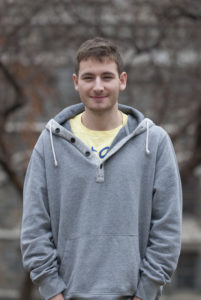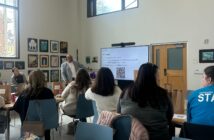
Jake Epstein
We drink it every day — sometimes in small sips and sometimes in thirst-quenching gulps that feel cold and refreshing. It doesn’t go in our cereal, and we don’t pour it into our coffee to make it taste better.
Water.
A necessity of life.
There are days, weeks or months that will go by, and I won’t even stop to think about my excessive access to water and how important it is.
Really, you can get it anywhere you go. From academic buildings to malls, sports venues to gas stations. There never seems to be a shortage of water.
But halfway across the world, there is.
In the Palestinian-occupied territories of the Gaza Strip and West Bank, communities suffer water shortages and require Israeli approval to pump water from shared natural resources. The Israeli government, however, has agreed to increase water sales from Israel to Palestine by 50 percent annually in a dramatic effort to improve livelihood without creating water shortages on the Israeli side.
This certainly is a start in the effort to combat this humanitarian crisis, but there is still a severe issue.
On my way to class one morning, I read a commentary on Reuters reflecting on the development of Israeli-Palestinian relations, and where United States involvement comes into play.
At first, it seemed the relationship between Israelis and Palestinians were starting to look more cooperative, but as I read on, it appeared U.S. foreign policy interests sought to make things more complicated.
The Trump administration recently made cuts to the U.N. Relief and Works Agency for Palestinian Refugees, an organization that has supplied aid to Palestinian refugees since 1949, when a refugee crisis that displaced many Palestinians occurred. Many of their descendants still live in refugee camps surrounding Israel today.
I sat down with Eric Fleisch, a lecturer of Jewish studies at Penn State University and adjunct professor of international relations at Lehigh, to discuss the impact of this.
Fleisch said the Israeli government has supplied the Palestinian government enough aid to prevent a government collapse, which could lead to a surge in radical anti-Israeli sentiments.
“Israel has tried to find the fine line between supporting the Palestinian government, but still putting enough pressure on it that it needs to come to some sort of negotiation,” he said.
Fleisch is referring to the Israeli government’s support as efforts to prevent the Palestinian government from collapsing and being overrun by hostile powers.
Meanwhile, the U.S. had cut a hefty percentage of its own support. This confused me.
Why would the Trump administration want to make things worse for the Palestinian government, if it could lead to a greater burden on Israel, an important American ally?
I considered the possible rationale behind this decision.
From a humanitarian perspective, it seems like a bad idea. The refugee crisis is enough, and resources are scarce. Cutting off aid only makes it worse.
I considered it from a policy perspective too, but it seems to me that this is not helping the Israeli or the Palestinian governments.
The first time I traveled to Israel in 2008, I drove past settlements along the West Bank, an area where these refugee communities exist. I was taken aback by how different the West Bank was from places I have seen, not just within the U.S. but throughout other places I have visited.
Rows of little houses, grouped together in small communities were scattered across hillsides and basins. The landscape was somewhat barren with small bushes and trees here and there. It was dry and obvious there was a desire for aid and a better quality of life.
To those of us living in the U.S., water is something we can pour on our heads when we get sweaty or hot. We leave the sink running because there is an unlimited supply of water to us.
But to others, having fresh water is a matter of life or death.
The U.S. and Israel both recognize water as a security issue — it is needed for a state or community to support an economy and develop their own resources.
Climate change and increasing population will only make obtaining water more difficult over time.
The general argument regarding who should occupy the “Holy Land” looms over the water crisis and is still the overarching issue.
Right now, the Trump administration is a year and a month into its tenure, coming in with the lowest approval rating so far of any president, according to a Gallop poll and reported by the Chicago Tribune.
To me, the slashing of Palestinian aid is a bad humanitarian and policy decision.
But perhaps the Trump administration will surprise us, as it always does, and unveil some bigger plan where all these pieces could fit together. And for the sake of those who just lost half their aid, I sure hope there’s a bigger plan.
—
Jake Epstein, ’20, is an associate news editor and columnist for The Brown and White. He can be reached jpe220@lehigh.edu.





Comment policy
Comments posted to The Brown and White website are reviewed by a moderator before being approved. Incendiary speech or harassing language, including comments targeted at individuals, may be deemed unacceptable and not published. Spam and other soliciting will also be declined.
The Brown and White also reserves the right to not publish entirely anonymous comments.
1 Comment
I’m not sure American aid to governments does much good. A good bit probably gets siphoned off by corrupt officials and criminal private citizens leaving those who don’t get it upset. One can hope that aid to Israel will be increased and they will pass it on. Even if US aid got to the people who need it I don’t think you will see much gratefulness exhibited by aid recipients. Direct people to people aid is best. I donate to some private agencies that deal in a more direct way we those in need.
ISIL persecutes non-Muslims and Muslims of different sects while it is difficult to find any Muslim nation that believes that Israel should exist. Palestinians could trade acceptance of infidels for water. I’m not holding my breath for it. If the Palestinians would stroke President Trump’s ego things might get better. I’m not holding my breath for that either.